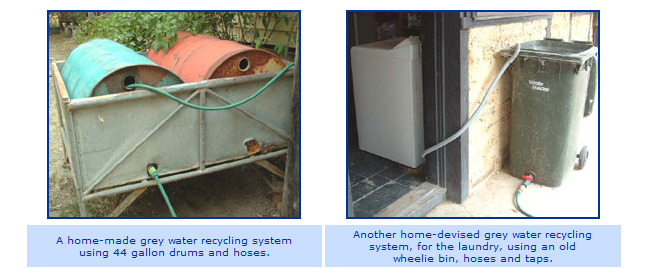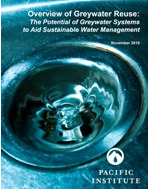Wastewater generated from domestic activities like bathing, washing and laundering is called greywater. Approximately 70 water of the water drained down the sewer in an average household is greywater.
Residential greywater can be can be easily collected and treated, and reused safely for garden irrigation and toilet flushing. By irrigating and flushing with greywater -- instead of freshwater -- a household can reduce more than a third of its water consumption.
Israel is a country currently facing a dangerous imbalance between supply and demand of freshwater. Reuse of greywater could contribute to the national goal of saving on water. However, it has still not been approved by the Israeli parliament. As of December 2010, treatment and reuse of greywater in Israel is illegal for the general public. A bill proposing legalization has already been reviewed by the parliament, but the Ministry of Health is hesitant to approve it, claiming it will put the public in risk.
My latest video report investigates whether domestic greywater treatment should be legalized, and shows how some Israelis are already doing it.
The Faculty of Civic and Environmental Engineering in the Technion (I.I.T.) has been doing extensive research on domestic water recycling. Professor Eran Fridler says that a greywater system like the one installed in the Hirsch household (see video report) can be set up inexpensively, in the backyard of any house.
In recent years, Israel's limited water resources -- along with the need to fund the massive investment in seawater desalination plants -- have forced the Israeli Water Authority to dramatically raise the price of water for private households. Since the water prices started climbing the demand for domestic greywater treatment systems has also been rising. It is hard to estimate the exact number of Israeli households that are reusing greywater because most prefer not to be exposed until greywater reuse is officially legalized.
According to Nitzan Horowitz, the Knesset member who has been lobbying for the legalization, there are thousands of households who have already installed greywater systems. In an interview I did with him a couple of months ago, Horowitz said:
It is already happening. The train has left the station. It's not like we are informing an unaware public about the option of reusing greywater and suggesting they install systems. There are many people who know about it and want to do it and many more that are already doing even though it is not permitted. Today there is a high demand for it.
The claim that greywater systems are in high demand amongst Israelis is supported by a simple online search. Googling "greywater systems" -- in Hebrew -- brings up over ten companies offering installation and supervision services for domestic greywater systems even though it is still considered illegal.
I met with representatives of two such companies -- the first preferred not be exposed, and the second is "Hametaher" -- and both said they have already installed greywater systems in hundreds of households and have seen many more homes which had improvised self built systems.

Source: Mansfield Online
Greywater Around The World
Reusing greywater domestically has become common is several drought-prone countries. It is most popular in Australia, where the government provides financial incentives to encourage people to reuse greywater at their homes. Japan, Germany, Cyprus and Jordan are a few more countries that have already set up regulation that monitors -- and therefore legalizes -- domestic greywater reuse.
In Arizona, which has the most supportive greywater policies in the U.S., there are guidelines educating residents on how to build simple, safe, efficient, greywater irrigation systems. California, Utah, and New Mexico have also regulated how greywater can be reused, but in most American states greywater is still considered sewage and bound by the same regulatory procedures of effluent disposal. The Greywater Gurillas is an American N.G.O. that has been encouraging people to reuse their greywater and helping install domestic systems, even in states where it is considered illegal.
According to a report published last month by the California based Pacific Institute, reusing greywater will save money for private households, and even more importantly, contribute to reducing the energy and carbon footprint of water services and improving the resilience of water systems to the impacts of climate change.
The Pacific Institute's research argues -- as did Professor Fridler from the Technion -- that all possible public health concerns as a result of wide spread domestic water recycling can be addressed, and regulations can be put in place to ensure that water quality is safe.

The Pacific Institute's report focused (also) on the Middle East water crisis. It explains that specifically in this -- arid, politically conflicted -- region, greywater reuse is key because it can help countries deal with the growing demand for water and reduce the possibility of conflicts over water. Meena Palaniappan of the Pacific Institute, who co-authored the report, writes (in the press release) about the importance of reusing greywater:
Greywater reuse is part of an important paradigm shift in how we manage water, toward a more rational approach where we match the quality of water to the need. By reusing greywater in the home for watering landscapes or flushing toilets, we can reduce the use of high quality, expensive, and energy-intensive drinking water for those purposes.
Links:
•California School to start reusing greywater, LA Times, December 2010
•Israeli wastewater is currently recycled in state treatment facilities, Haaretz, November 2010
• Greywater to green your home, WasteCorp blog, June 2009
• Slideshow about greywater, SA Health
